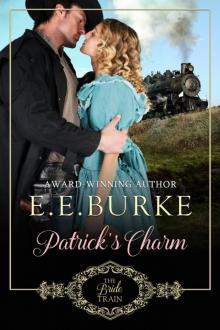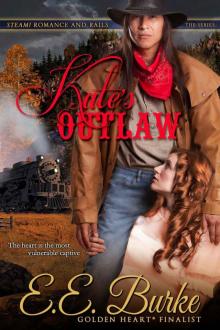- Home
- E. E. Burke
Victoria: Bride of Kansas (American Mail-Order Bride 34)
Victoria: Bride of Kansas (American Mail-Order Bride 34) Read online
Victoria
Bride of Kansas
E.E. Burke
Victoria, Bride of Kansas is a work of fiction. Names, characters, places and incidents are the product of the author’s imagination or are used fictitiously.
Copyright © 2015 E.E. Burke.
All rights reserved, including the right to reproduce this book in whole or in part in any form.
Cover Design by Erin Dameron-Hill
Digital formatting by Author E.M.S.
Amazon Edition
Published by E.E. Burke
ISBN eBook 978-0-9898192-9-9
Dedication
This book is dedicated to my dear friend Sunny “Bobbie” Cole.
Thanks for pushing me to be my best.
“There is only one happiness in life, to love and be loved.”
George Sand
Chapter 1
December 1, 1890, Fort Scott, Kansas
Wanted, woman of good standing, possessing homemaking skills, willing to care for and educate a motherless child.
David O’Brien laid the pencil on the desk. That might work if he was advertising for a housekeeper or governess, but what young lady seeking a husband would respond? Ordering a bride ought to be simple. Like requisitioning inventory. Why then, was it so difficult to come up with a forty-word personal advertisement?
He scrubbed his fingers through his hair. Saints above, he didn’t have to do this. He wasn’t a farmer who lived in some remote area; he had choices. He could woo one of the ladies in town. His selection would be limited to those willing to marry a divorced man with a six-year-old, which reduced the list of candidates considerably. Besides, he didn’t have time to go courting. He had a store to run.
David dug for his timepiece, popped the catch with his thumbnail. Almost eight. The walk needed to be swept and the store prepared for opening. Ordering a bride would have to wait.
As he stood, he took a moment to rub at a dull pain radiating down his right leg. The old injury ached like the very devil when the weather turned cold. Moving around the desk, he squeezed past filing drawers crammed into the small office. The storage area presented another obstacle. Crates, barrels and sacks of dry goods and groceries filled the limited space. If he scrimped, he might have enough to rent the building next door.
His folks had talked of expanding. Irish immigrants with big dreams they hadn’t lived long enough to fulfill. O’Brien’s stood as a tribute to them, his legacy.
Inside the quiet store, mellow scents of tobacco, leather and coffee mingled with the sharper odors of cheese and dried meat. Even fresh fabric had a unique fragrance. He loved the smell of a general store. Far back as he could remember, he’d been surrounded by these familiar scents and found them comforting. He stopped to put another log into the pot-bellied stove, and upon opening the grate released smoke into the air—one smell he did not find comforting.
He grabbed a broom by the door and went outside. Keeping the sidewalk swept meant less dirt tracked into the store. If those clouds were any indication, he’d soon be shoveling snow.
Why, he ought to put snow shovels in the front window. That upstart New Yorker who’d opened the Five Cent Store across the street might not carry them, seeing as shovels cost more than a nickel.
“David?” Maggie peered out the front window and waved for him to come inside. His sister usually got Fannie her breakfast before they ventured downstairs. Had his daughter wandered off again?
With a sigh, he returned inside. He’d never be able to keep up with a curious six-year-old and run the store without his sister’s help. If he put off expanding, he might be able to hire someone. But Fannie needed more than a caretaker. She needed a mother.
Fannie stood by the counter wrapped in her heaviest coat. Being bundled up to her eyeballs should make it more difficult for her to slip away. Her aunt had secured a woolen scarf around her head and face, not even a strand of hair remained visible, only a pair of inquisitive eyes.
Maggie laid her hands on Fannie’s padded shoulders. “Sweetie, why don’t you go out back and check on the kittens. Have you named them yet? What about that orange tabby?”
David waited, sent up a silent prayer. Dear God, please. How long could his daughter remain silent? The doctors’ advice had proved useless. Bribes hadn’t worked. He didn’t have the heart to follow through with threats. His poor child had suffered enough. Having a new mother might help. He’d run out of other ideas.
“No names yet? All right, well, go on with you, then,” Maggie said with a cheerful smile.
He released dismay in a heavy breath. He no longer shared Maggie’s optimism, and he had long since stopped being cheerful.
Dutifully, Fannie turned and disappeared into the back room, sent on the errand, no doubt, so Maggie could speak with him privately. Otherwise, his sister would’ve gone along. She loved playing with the kittens as much as Fannie did.
Maggie waited a moment and then checked the back room. Perhaps to make sure Fannie was out of earshot. There was nothing wrong with the child’s hearing. Satisfied, his sister moved quickly in his direction.
She wore the light blue suit with velvet trim he’d purchased as a gift after she’d graduated from that teaching school in Emporia. Her dark hair was styled on top of her head in a loose arrangement she called “careless.” Maggie was never careless with anything, save her hair.
“You look very nice this morning. What’s the special occasion?”
“That’s what I wanted to talk to you about.” She fingered a small gold watch she wore pinned to her bodice, a sure indication she was nervous about something. Her hand went into a deep pocket sewn into the side of her skirt. She often kept hard candies hidden away for herself or Fannie, candy she swiped from the jar on the counter while he pretended not to look. “I have a confession to make.”
“Candy thievery? I already know about that. We’ll negotiate jail time.”
“No, it’s something worse, or better, depending on how you look at it.”
David tightened his hold on the broom. A part of him wished to sweep her away before she could tell him what he already knew; she had accepted a teaching job near Kansas City, three hours away by train. “You’re leaving after Christmas. You already told me.”
“Don’t look so worried.” She went up on her toes and dropped a kiss on his cheek. “I won’t leave you without help.”
He released a pent-up breath. Thank God, she’d changed her mind. The thought of marrying again put him in a sweat. “I knew you’d reconsider.”
Maggie responded with a look of sad reproach. It went without saying that he was being selfish. He couldn’t expect his sister to put her life on hold indefinitely. She deserved to pursue her dreams, which was why he had to go through with his plan.
A year ago, he’d told her he intended to send off for a mail-order bride. She’d declared it romantic. Ordering a bride was the least romantic thing he could imagine. Besides, he wasn’t looking to find love and didn’t want love to find him. He’d had enough of that unreliable emotion, thank you. He would take a more reasonable approach to marriage this time.
“I’m about finished with the advertisement.” He reached into his coat pocket and pulled out the notice, which had been tinkered with and folded so many times it was smudged and dog-eared.
Maggie averted her gaze. The natural pinkness in her cheeks darkened, or was he seeing things? The day was early and the interior of the store remained dim. He would turn up the lights if gas weren’t so expensive.
Overcoming his reluctance, he held out the paper. “Do you have any suggestions for wording?�
�� He took pride in his sister’s education, and she had a gift for writing. He barely got by. “I promise I’ll post it tomorrow.”
“You don’t have to post the ad.”
His spirits lifted, despite his best intentions to be selfless. “You’ll stay?”
“No.” Her tone had a sharp edge. He met a pair of eyes so dark it was difficult to tell where the irises ended and the pupils began, eyes the same color as those he saw in the mirror each morning. His father had told him their “black eyes” were handed down from some long-ago Celtic warrior. He and Maggie had also inherited that ancestor’s fighting spirit. Generally, they didn’t face off against each other, so her irritation with him made no sense.
“What is it you’re saying?”
She pulled something out of her pocket that looked like several envelopes tied with twine. “These are letters from Miss Victoria Lowell. Letters she wrote to you.”
He set the broom against a table. Surely, he hadn’t heard what he thought she’d said. “Letters to me? Who’s Vic—?”
“I suspect Miss Lowell will have your letters when she arrives.”
He’d heard that clearly enough. “I haven’t written any letters, and I don’t know any Victoria whatever her name is.”
David frowned at the letters in Maggie’s hand. He jerked his attention to his sister’s face—guilty as hell. Alarmed, he reached out for the packet of letters in her hand. “Give me those.”
She took a step backwards. “I will. But let me explain first. I posted an advertisement with the Grooms’ Gazette—”
Panic tightened the vise pinching his chest. “What the devil?”
“I had to do something, David. You weren’t going to. All you do is talk about it. You know I can’t leave without making sure you and Fannie will be all right.”
By God, she’d ordered him a bride, like she would order a pair of shoes for his birthday.
“I even took care of the correspondence, because I know how much you hate writing, and I’ve arranged everything.” She babbled on, undaunted by his growing fury. “Miss Lowell will be perfect. You’ll see.”
“Arranged everything? You mean, you’ve already sent for her?” David’s temperature soared a hundred degrees. He took a threatening step, contemplated turning Maggie over his knee. Never had he laid a hand on his baby sister, not even when she put salt in the sugar barrel and he got the whipping. He had protected Maggie and taken care of her, ever since the day they’d been left homeless…and this was how she repaid him. “What the hell have you done?”
Maggie met his furious glare with an unrepentant one. “I’ve done you a favor, that’s what I’ve done. Mark my word, Davy, one day you’ll thank me.”
She shoved the packet of letters into his hand. “Miss Lowell arrives at the station today at noon. You have a few hours to acquaint yourself with your new bride by reading her letters, so I suggest you get started.”
* * *
Dead leaves stumbled across the tracks and somersaulted over the boarding platform, swirling around the hem of Victoria’s traveling suit before dancing off to tumble down a set of stairs. She dropped her satchel next to the large case she’d hauled off the train.
After three exhausting days and sleepless nights, she had arrived in Fort Scott, near the southeastern Kansas border. Beyond the brick and stone depot topped with an impressive clock tower lay the bustling railroad town that would be her new home. The past, with all its unhappiness, was behind her. Soon, her life would change. Things would be different. Better. She would no longer suffer false friends and unsympathetic family. She would no longer be lonely and unloved. Today, she would meet her romantic suitor, a man she had traveled over a thousand miles to marry.
“David Patrick O’Brien,” she spoke his name under her breath, loving the way it tripped off her tongue. “Where are you?”
Other passengers streamed past as she bounced on her toes and craned her neck to see over their heads. She’d never actually met Mr. O’Brien, but she would recognize him from the cabinet card he’d sent with his first letter. With a shiver, she drew her fur-lined cape close to block the cold wind while she searched the faces of strangers in the thinning crowd
A whistle sounded. The locomotive gave an impatient huff.
Those departing were leaving, and passengers going on had boarded. Ten-minute stops didn’t allow for the luxury of loitering.
Her anxious gaze swept the platform. Where could he be?
She fumbled with her satchel and retrieved the cabinet card. Unnecessary, considering she’d studied it enough to memorize every feature. The photograph showed a darkly handsome, if somewhat serious, young gentleman wearing an old-fashioned suit with a starched collar. Possibly, he’d had his picture taken a few years back and he might look different now, or perhaps he hadn’t seen her. That seemed unlikely. She was the only passenger remaining beside the train.
One of the porters handling luggage approached. “Miss? You waitin’ for somebody?”
How nice someone had noticed her. She was beginning to think she was invisible.
“Yes, my fiancé is meeting me.”
“Gettin’ hitched?” The porter grinned, his teeth very white against his ebony skin. “Ain’t he the lucky one.”
She hoped Mr. O’Brien agreed. He had replied to her inquiry within two short weeks, had proposed in the second letter and with the third had sent her fare and urged her to come to me with all haste. A man that eager to be wed wouldn’t abandon her at the train station.
“Perhaps you’ve seen him?” She held out the cabinet card.
The porter took a good look at the photograph and then returned it. “No ma’am. Ain’t seen anyone around looks like him.”
“Oh…” Victoria’s hopefulness deflated. “Well, thank you.”
Black smoke from the retreating train blew across the platform and into her face. The stinging smoke made her eyes water. She blinked.
“You all right, miss? Here, take my handkerchief.”
“Thank you, but no, I don’t need it. I’m not crying. It’s just the smoke.” The tendency to weep at misfortune had been drummed out of her at a very early age.
“Course not. Pretty lady like you got nothin’ to worry about.” The porter eyed her large suitcase. “Want me to take that for you? You might want to wait inside.”
The depot would be a warmer place to linger, but Mr. O’Brien had specifically told her to remain on the platform and he would find her. Didn’t seem wise to leave just yet. “Please put it by the door until my fiancé arrives.”
Victoria withdrew a gold eagle from a change purse and handed it to the porter, relieved when he carted the heavy suitcase away. He would get another tip when he took it to Mr. O’Brien’s carriage. Or was that too generous? A frugal seamstress named Poppy had warned her to be prudent with her money. She’d used most of her available cash to set up a fund for women left jobless after a garment factory burned down. Philanthropy aside, she felt responsible because her family had benefited from the income the factory had produced.
She tucked her change purse back into her bag. If she contacted anyone back home, including the banker, her father would send someone after her. Not because he wanted her—he’d never made a secret of his disappointment—he simply disliked losing anything that belonged to him. A thousand miles ought to be far enough away to escape from beneath his heavy thumb, and being wed to an Irish Catholic shopkeeper would virtually ensure being disinherited.
David O’Brien wasn’t rich, but he’d assured her he could support a family comfortably. At any rate, she wasn’t marrying him for his money. She wanted something that couldn’t be bought, something she hadn’t been able to find in her wealthy, influential social circle. Something she would travel to the ends of the earth to find. True love.
So, where was he, the man who had swept her off her feet with his romantic prose?
She took another look at the end of the platform where several people who’d exited the depot w
ere milling about. One man had his shoulders hunched against the wind and a woolen scarf wrapped around his face, so she couldn’t make out his features. However, he seemed too short and rather rotund. Her fiancé stood five feet ten inches in his stockings, and had described his build as lean. Honestly, she wouldn’t care if he was short, round and bald-headed as long as he treated her with the same kindness and respect he’d shown in his letters.
Victoria hugged her arms and began to hum, A Kiss in the Morning Early, an Irish love song he’d shared in his second letter. She’d asked around among the factory workers and had found an Irish girl, Sarah Fitzgerald, who taught her the song. Victoria imagined her love singing it to her, and kissing her each morning. Sarah had declared Irish men to be very romantic.
Her Mr. O’Brien wouldn’t disappoint. No, indeed, he would not. He had promised he would be here, and he would keep his word. The man who’d penned poetry and sent her love songs wouldn’t jilt her, as Bertram had done.
* * *
Muttering expletives, David leapt off the seat of the wagon, holding onto his hat so the wind wouldn’t blow it away. He hitched the horse and loped across the street in the direction of the depot as fast as he could go, given his uneven gait.
He had a good excuse for being late and it wasn’t due to misjudging the time. Not that he expected the unwanted bride his sister had ordered to understand. By her own admission, Miss Lowell had never worked in a mercantile. Why Maggie thought she would make him a perfect wife was beyond him.
Still, he felt bad about leaving her out in the cold. If she was as smart as she sounded in those letters, she ought to have the good sense to go inside the ladies’ waiting room where a stove would be lit. The Gulf depot had a very fine diner. In fact, she could have dinner before the next train arrived. He’d give her money for food and a return ticket. That was the least he could do, considering none of this was her fault.

 Jolie- A Valentine's Day Bride
Jolie- A Valentine's Day Bride Redbird
Redbird Valentine's Rose
Valentine's Rose The Drum_The Twelfth Day
The Drum_The Twelfth Day Tempting Prudence: The Bride Train
Tempting Prudence: The Bride Train Victoria: Bride of Kansas (American Mail-Order Bride 34)
Victoria: Bride of Kansas (American Mail-Order Bride 34) Santa's Mail-Order Bride
Santa's Mail-Order Bride Patrick's Charm (The Bride Train, #2)
Patrick's Charm (The Bride Train, #2) Santa's Mail-Order Bride (American Mail-Order Bride 34.5)
Santa's Mail-Order Bride (American Mail-Order Bride 34.5) Maybe Baby
Maybe Baby Victoria_Bride of Kansas
Victoria_Bride of Kansas Seducing Susannah: The Bride Train
Seducing Susannah: The Bride Train Kate's Outlaw (Steam! Romance and Rails)
Kate's Outlaw (Steam! Romance and Rails)